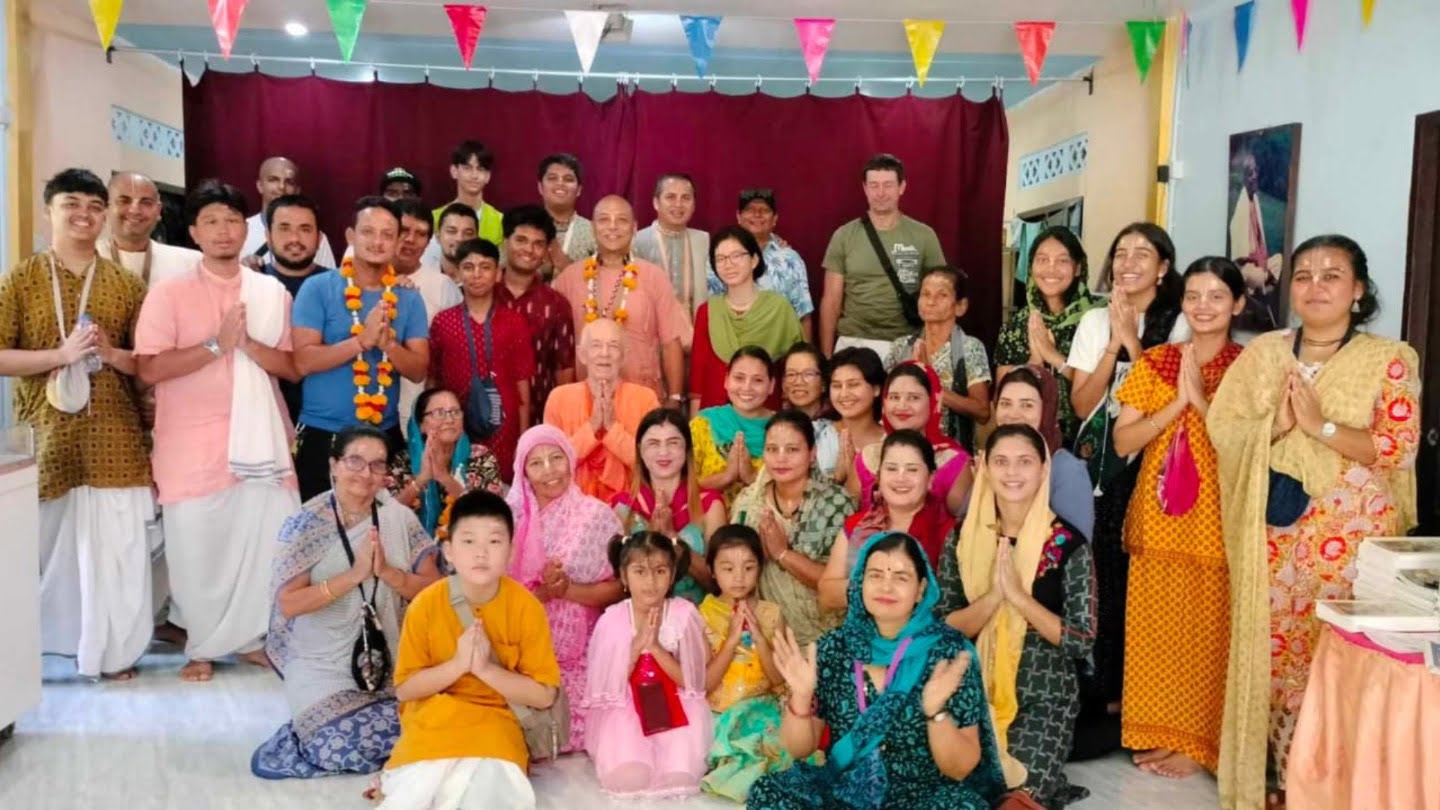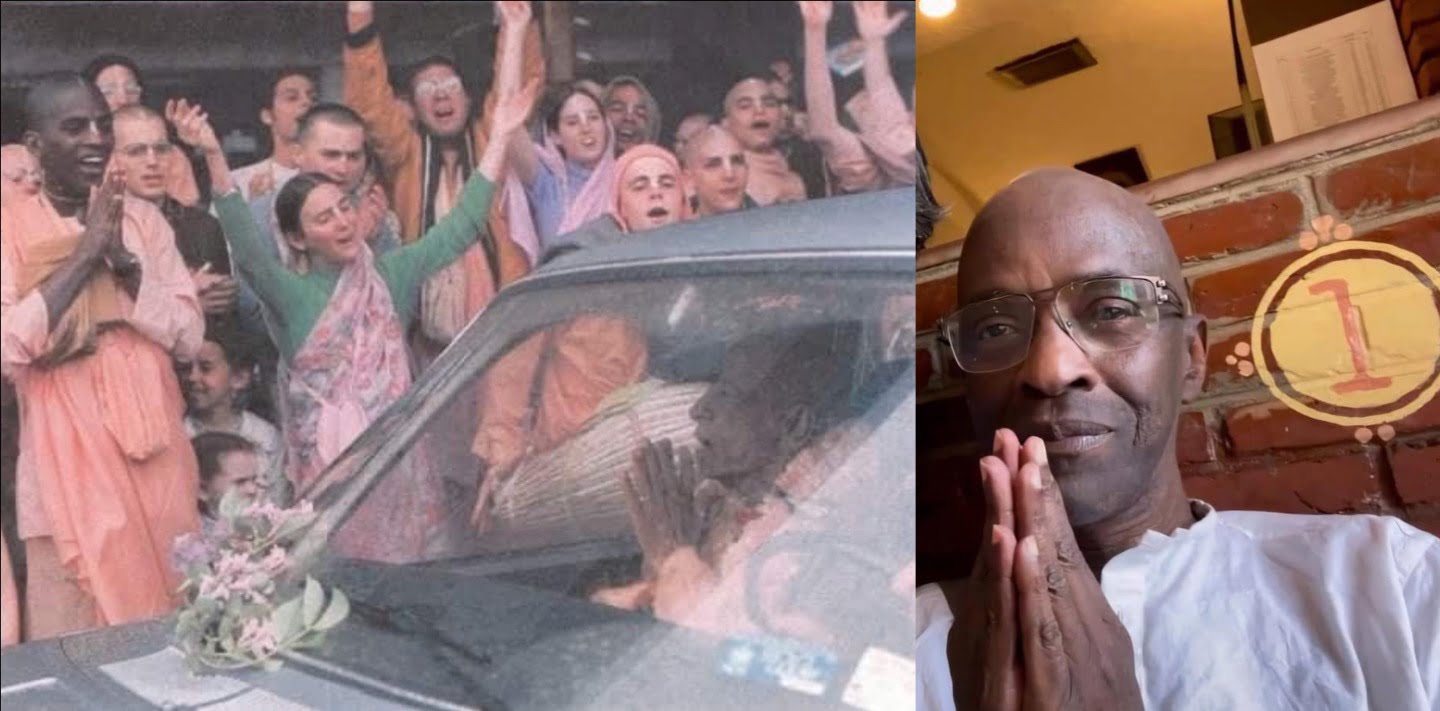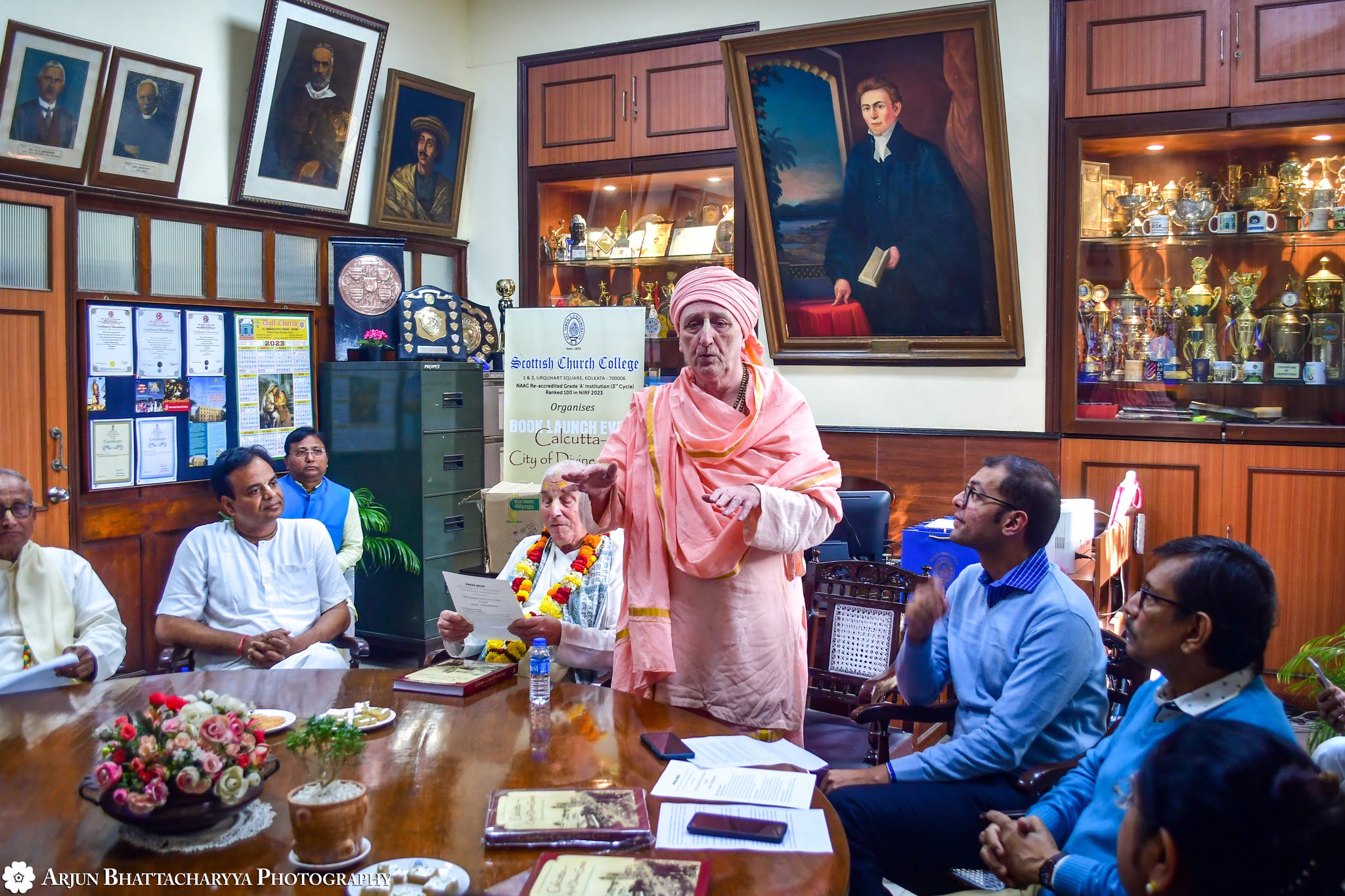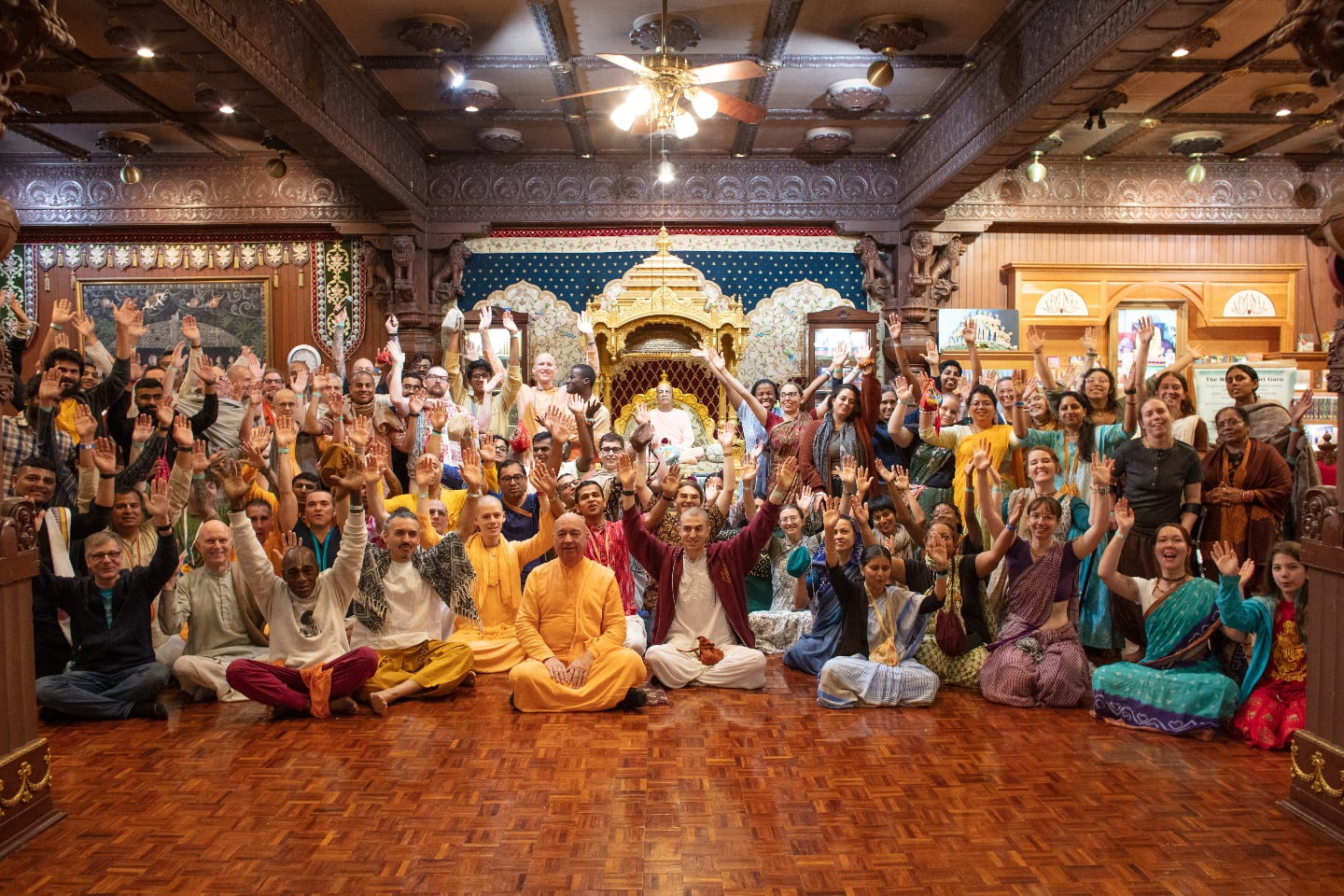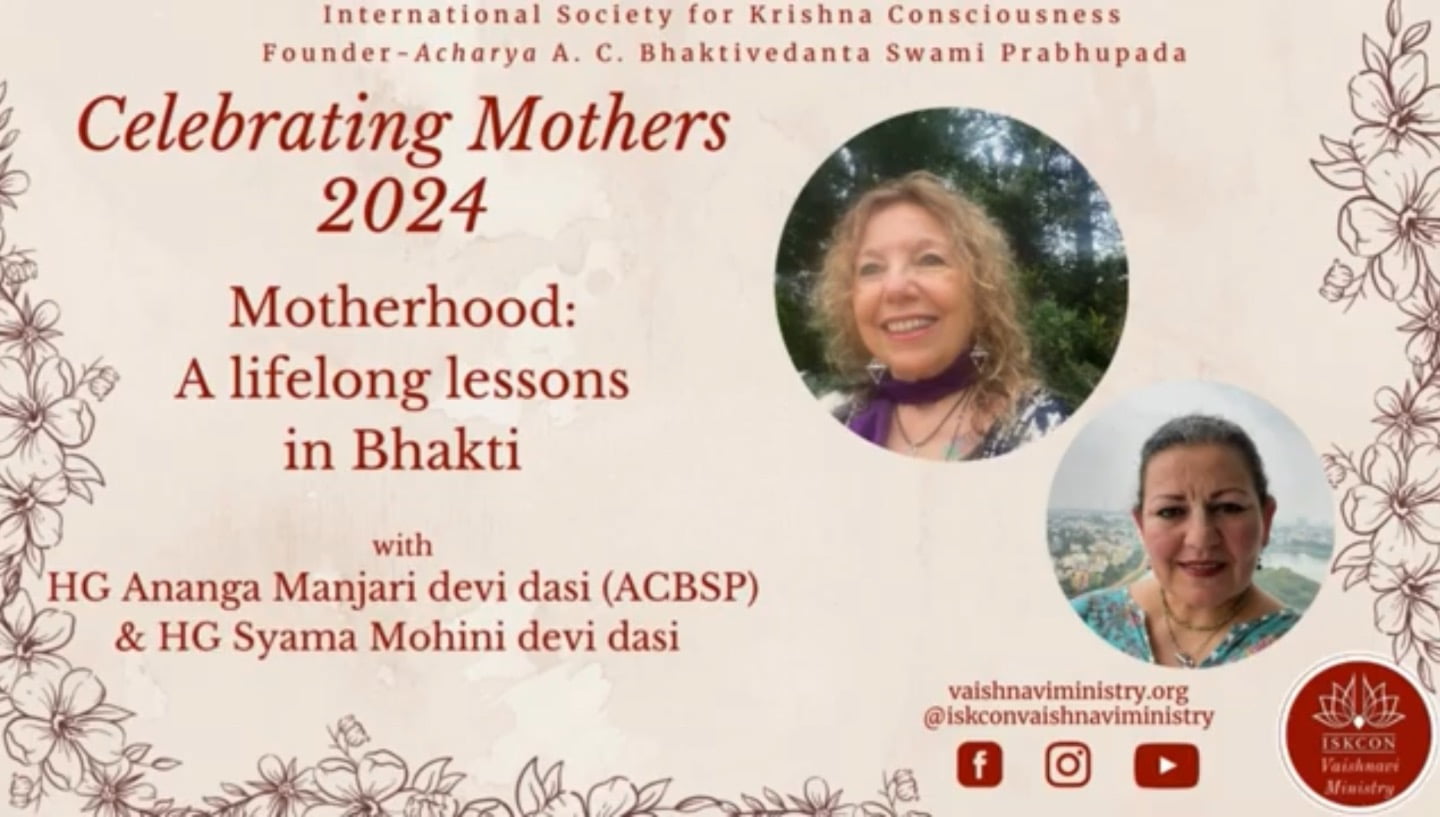Loving Ourselves, Part Two
By Chris Fici (Krishna Kisore Das) | Aug 02, 2012

The surrender and sacrifice we need as a community of devotees in ISKCON to fulfill Prabhupada’s desire and be relevant in the world that surrounds us must come from a foundation of love and care, of concern for the peaceable minds of the devotees we live and serve with, and not from whatever demand of obligation we may invent from within our false ego.
As Krishna says:
“One who is not connected with the Supreme [in Kṛṣṇa consciousness] can have neither transcendental intelligence nor a steady mind, without which there is no possibility of peace. And how can there be any happiness without peace?” (Bhagavad-Gita 2.66)
When our sincerity drives our moral and spiritual compass, then we will able to understand how to strike the proper balance between need and sacrifice in our devotional lives, and we will also be receptive to others’ guidance to help us to do so. Our sadhana, our attachment to hearing and chanting, helps us to become receptive to the guidance of the Supersoul, our caitya-guru within us, to strike this proper balance. Most importantly and viscerally, we need a caring environment where we are comfortable to express and find fulfillment in our genuine human and personal needs.
When we are striving to bring all this into alignment, then we can understand that sacrifice and surrender is not an imposition upon us by impersonal elements, but that it is learning how to make the process of Krishna consciousness work for each of us on an individual level. From there, we can enter as a community into a transcendent place together, overcoming our collective limitations to do something truly profound as Srila Prabhupada has lovingly asked us to do.
What happens when these vital considerations are not acknowledged? As Sacinandana Swami has noted in his extensive career as a devotee, it creates a number of devotees walking around who have “burnt to ashes.” Maharaja has expressed very clearly that this breaks his heart, as it would for any sensitive, sincere devotee. This is painful to see for anyone who has a genuine amount of care in their heart. Most importantly, Krishna is deeply pained if this the substance of the offering of our self to him.
We are reciprocal beings by nature. It is awfully hard to give love if we do not feel loved ourselves. As Maharaja writes in his essay:
“Only if we meditate deeply on the fact that we are beloved children of the Supreme are we able to love others unconditionally. Why? Because understanding that we are loved fills us with love.”
We have a tremendous responsibility, and I don’t think anything is more important, to give each other the love and care we need and deserve. We can do nothing else that will please Krishna more than to be vessels of His love for all of us by making that love manifest in our relationships and communities. We have to be willing to purify our consciousness of the false ego, and all the personal power games that manifest there, to be able to give this love and care.
What is an example of something that needs to be purified in our consciousness? I believe we need to understand the real definition of love, which means we need to transcend our tendency to be a “love vampire.” Maharaja writes:
“The problem people who don’t feel loved have is that they wish to fill themselves with the love of the people around them, but they almost never admit their neediness. Instead, they hide their emptiness and needs from the outside world and instead project the image of the strong autonomous hero or the tireless and self-sufficient welfare worker.
However, deep inside such persons cries a neglected, love-hungry child. In order to satisfy the child’s craving they become – well, to use a dramatic word – love-vampires. Famous entertainers, but also spiritual leaders, have been seen to relate with their audiences only to obtain love, admiration, gratitude, or some other form of attention. The inspiration, entertainment, or help they offer others is, in other words, tainted by their covered selfishness and can therefore never be pure or truly inspiring.”
This is something I have particularly noted in my own life. I have a striking imbalance between pretending not to need anyone else’s love, and then desperately needing everyone’s love to validate my own existence. In the middle of all that, I forget to give what love I have, as selflessly as I can. To transcend our “love-vampire” tendencies, we must learn to need and accept love from others so that it doesn’t become yet another dependency of our false ego.
Of course, our “love-vampire” tendencies is just one aspect of facing our shadow, of owning up to our false ego, and all of us in ISKCON, individually and collectively, have much to do in this regard. It is when we run from our shadow, or when we face it in a way that is ultimately destructive to ourselves and to others, that we become one of the “ashy” refugees of a failed spiritual journey.
Our shadow has a voice which speaks to us, and all too often this voice drowns out the sound of Krishna within us trying to speak to us. Maharaja writes:
“A number of humankind’s spiritual traditions detail the obstacles we encounter on the spiritual path. Most list lust, greed, anger, envy, and many, many other embarrassing forms of selfishness as the formidable enemies that plague an aspiring transcendentalist.
I have met many people who are tortured by their weaknesses and even more so by that inner voice that constantly criticizes them for all their big and small blunders. In some people this voice has become so insistent that it has driven them to the abyss of fear, guilt, and anger—or worse, to hopelessness, sadness, and even desperation. These people believe the nagging voice and have created a personal mantra: “I’m not good enough. I will never do anything right. I have no chance. I’m certainly not lovable. Rather, I’m worthy only of being hated.”
This voice is the ugly signature of the false ego-it pushes us beyond all reasonable limits.
The heart, where Krishna resides, does not speak like this to us. He is sweetly urging us on, encouraging us, giving us our foundation and parameters.”
Our lives as devotees are a serious business, an endeavor which requires every ounce of our sobriety and sincerity, and this is rarely if ever more true in the confrontation with our own shadow. Maharaja adds:
“I feel the scriptures teach us to confront our shadow with maturity and at the same time to avoid identifying with it. Sometimes, for instance, the scriptures advise us how to transform obstacles such as lust and greed by bringing them into contact with Krishna. Bringing lust into contact with Krishna means to use its tremendous emotional energy to spiritually reconnect. Practically, this may become a hankering for good association, for new information about Krishna, or a seeking of circumstances in which we can release our energy in Krishna’s service.
Isn’t lust all about hankering and using energy? And if we bring the light of Krishna’s divine presence toward the shadow, the shadow will dissolve.”
Facing our shadow is part of the process of tending the garden of our devotional heart. I have always understood the process of anartha-nivrtti as a confrontation of sorts with the aspects of our selves which cover our true nature as a devotee. Removing the weeds from our hearts is not just a matter of ripping the weeds out, and neglecting the roots that are still there. Of the many things I learned serving in the organic farm project at New Vrindaban, it was that if you don’t remove the weeds by the roots, then they will come back quite soon.
Anartha-nivrtti does not happen so automatically. Confronting our shadow, and removing the weeds means that we see, acknowledge, forgive, and transcend the very worst of our self to come to the best of our self. We need a strong personal sadhana and a community of like-minded and advanced souls to guide and nurture us through this essential part of our journey.
All too often we find ourselves frightened and intimidated by the process of anartha-nivritti, and we end up trying to repress our shadow. Maharaja writes of the effects of such repression:
People with a repressed shadow – people who have a heavy iron lid covering an unlived emotional life – have various symptoms by which others can discern their demons. Remember, such people must look good in their own eyes and in the eyes of likeminded people.
The first symptoms of persons with a repressed shadow is that they will always be very, very hard on themselves and on others as well. They will try to hide their personal dissatisfaction by dressing themselves in weighty iron armor, an armor usually constructed of rigid morality. Then they will find fault with anyone in their environment who doesn’t conform to their standards. These people are so tense that they find it hard to lighten up under any circumstances; and they are often quite bitter. Oh, yes, and they are super heavy – or to put it in more psychological terms – super angry. Anger and fear are just the opposite of what we want to attain: love!
It’s better to acknowledge our weaknesses and to deal with them from a position of strength. Sometimes we may even choose to laugh at our weaknesses.”
In order to love ourselves, we have to first see ourselves. This included all of the good, the bad, and the ugly. The tendency we have is to criticize ourselves, and give ourselves a hard time, but then we can carry a overtly negative and dissatisfied energy into the world, which is a death-knell to the development of our relationships and our community.
Instead, we need to embrace the sincerity within our heart. This is so lovable to Krishna, and to ourselves. We need to avoid getting so absorbed in the negativities of our false ego, for this is not who we actually are. We build up walls of our negativities, and we hurt ourselves, and we hurt others.
We need to have a holistic approach to our shadow, seeing it for what it is, and being grounded in the truth of Krishna’s love. It starts with feeling OK with where we are and who we are, based in the foundation of Krishna’s love and care upon us, like a parent to its child.
Then we are willing to be shaped by Him. Even if it is “tough love”, we will see it in this proper perspective, rather than seeing it as punishment.
For those like myself, still a bumbling neophyte, It’s very difficult to experience Krishna’s love directly. We hear that His love comes through His devotees, and we put a lot of trust and faith in that our superiors are going to give us this love. It is perhaps the greatest failure of ISKCON’s history so far that we have failed, in many instances, to give Krishna’s love in this way. His love is not some esoteric mystical thing but the most practical and present of affections.
We need to provide an environment where we can allow each other to receive this love from all angles. This is the most pressing and urgent need we face in ISKCON right now. We have to want this, and if we don’t recognize the need for this, we will just be blind-sided by this need, or oblivious to it
In our relationships and communities, we need a mature framework, in which we come to understand and honor every devotee’s needs and capacities, and in which we recognize the genuine differences and inherent humanity in each devotee. If we want devotees to surrender and expand Prabhupada’s mission, to do more than they are capable of, they need to feel appreciated and loved for who they are first. The sincerity of their heart’s desire to give their lives to Krishna has to be honored and not violated.
We have to be happy in our Krishna conscious lives. Pure devotees can accept anything that comes, but we are not at that level and we need to be conscious to and aspire to what makes us happy in our Krishna consciousness.
We are travelers together to the kingdom of God, and the bonds we build together on our travels will insure that we reach our destination. Maharaja writes:
Travelers to the kingdom of God know they need body, mind, and other companions to succeed; therefore they regularly nurture their relationships with these three beings – especially their relationships with others. They know that such persons are the gifts of the Lord.”
The personal relationships we have with each other are actually the greatest gifts from Krishna. They nurture, sustain, and inspire us. They are the most valuable commodity in our lives. Nothing we aspire to as a collective society will ever reach its full fruition without keeping these sacred relationships in the center, honoring them fully as the essential foundation of our spiritual lives.
Maharaja concludes by writing:
“Each day we should set a little time aside to celebrate our progress. We can review the day and remember what went right. Today we served with intelligence, words, and deeds. Today we helped another devotee and influenced another life in a positive way. As we celebrate such small victories and successes, we should be mindful that all that happened was possible only because we received an investment of mercy from above.”
We are called to surrender, but to surrender is a matter of the heart. It is not a demand, but a choice. We need each other to inspire each other to understand and to choose how to give our best offering to Krishna. We cannot do that in an impersonally pressurized environment.
We have to really want each other to thrive. Only in personalism will we discover how to push beyond the limits we set around ourselves, as individuals and as a society, and then can we really swim in the current of Guru and Vaisnava’s blessings.







